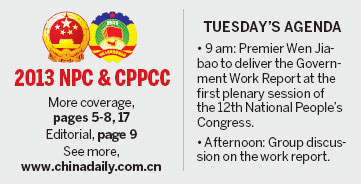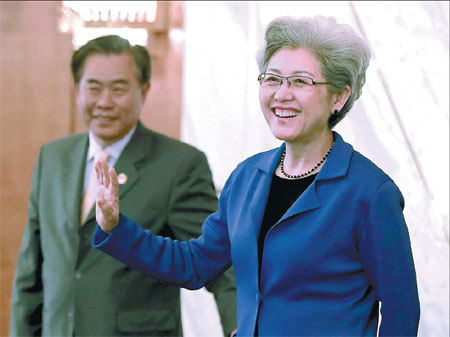Tokyo blamed for islands tension
Updated: 2013-03-05 07:51
By Zhang Yunbi (China Daily)
|
||||||||
|
Fu Ying, the first spokeswoman for the National People's Congress, makes her debut at a news conference in Beijing on Monday. Feng Yongbin / China Daily |
China's maritime growth aims to defend and help regional peace: spokeswoman
Japan has sabotaged its consensus with China and invalidated the basis for China's restraint, the spokeswoman for the National People's Congress said on Monday, blaming Japan for escalating tension over the Diaoyu Islands.
Fu Ying also rejected allegations that China was seeking to establish hegemony through its maritime growth. Beijing's defense policies help maintain regional peace and stability, Fu said.
Observers warned that Tokyo must take the blame for souring Sino-Japanese ties because it has repeatedly gone back on its word and betrayed an agreement it made with Beijing decades ago about shelving the dispute.
Fu, on behalf of the country's top legislature, said China is willing to resolve tension through negotiations, and she quoted the Chinese proverb "One hand alone cannot clap" to indicate that Japan has failed to engage in negotiations.
The Japanese government in September illegally "purchased" part of the Diaoyu Islands, and Fu said the move went against the consensus and in turn shook China's basis for maintaining restraint.
"That's the reason why China's patrol vessels have been seen around the Diaoyu Islands," said Fu, also a vice-minister of foreign affairs.
Lu Yaodong, director of the department of Japanese diplomacy at the Institute of Japanese Studies at the Chinese Academy of Social Sciences, said Japan's behavior and inability to honor promises it made has damaged ties and deadlocked diplomacy over the islands.
"Japan's illegal 'purchase' smashed the status quo, and the move betrayed its previous promises of resolving sensitive issues through dialogue and reconciliation," Lu said.
Chinese Ambassador to Japan Cheng Yonghua told Xinhua News Agency on Sunday that Japanese Prime Minister Shinzo Abe's administration has not handled the situation well, and the islands have become the "biggest challenge" to improving China-Japan relations.
Three China Marine Surveillance ships patrolled the islands in the East China Sea on Monday, the Japanese coast guard said.
In response to a question about China becoming a maritime power, Fu said the buildup was necessary as China engages with the global community more.
"But the path still lies in seeking peaceful development, cooperation and win-win situations, especially maritime cooperation with neighboring countries," Fu said.
Some countries, including Japan, have labeled China's maritime buildup as a threat to freedom of navigation.
But Li Guoqiang, deputy director of the Center for Chinese Borderland History and Geography at the Chinese Academy of Social Sciences, dismissed these concerns.
"Some neighbors have challenged China's maritime rights and interests because of their own strategic and national interests," Li said.
Meanwhile, China's foreign and defense policies are conducive to security and peace in Asia, Fu said.
"It's not good news for the world that a country as large as China is unable to protect itself," she said when citing the tragedy inflicted on the country by militarism in the first half of the last century.
Qu Xing, president of China Institute of International Studies, said some international voices have questioned China's path of peaceful development.
China should firmly guard its lawful rights and interests when threatened, and its diplomacy "should be flexible enough to stop situations spiraling out of control", Qu said.
Xinhua contributed to this story.
zhangyunbi@chinadaily.com.cn

(China Daily 03/05/2013 page1)

 In Photos: 7.0-magnitude quake hits Sichuan
In Photos: 7.0-magnitude quake hits Sichuan
 Li Na on Time cover, makes influential 100 list
Li Na on Time cover, makes influential 100 list
 FBI releases photos of 2 Boston bombings suspects
FBI releases photos of 2 Boston bombings suspects
 World's wackiest hairstyles
World's wackiest hairstyles
 Sandstorms strike Northwest China
Sandstorms strike Northwest China
 Never-seen photos of Madonna on display
Never-seen photos of Madonna on display
 H7N9 outbreak linked to waterfowl migration
H7N9 outbreak linked to waterfowl migration
 Dozens feared dead in Texas plant blast
Dozens feared dead in Texas plant blast
Most Viewed
Editor's Picks

|

|

|

|

|

|
Today's Top News
Live report: 7.0-magnitude quake hits Sichuan, heavy casualties feared
Boston suspect cornered on boat
Cross-talk artist helps to spread the word
'Green' awareness levels drop in Beijing
Palace Museum spruces up
First couple on Time's list of most influential
H7N9 flu transmission studied
Trading channels 'need to broaden'
US Weekly

|

|








